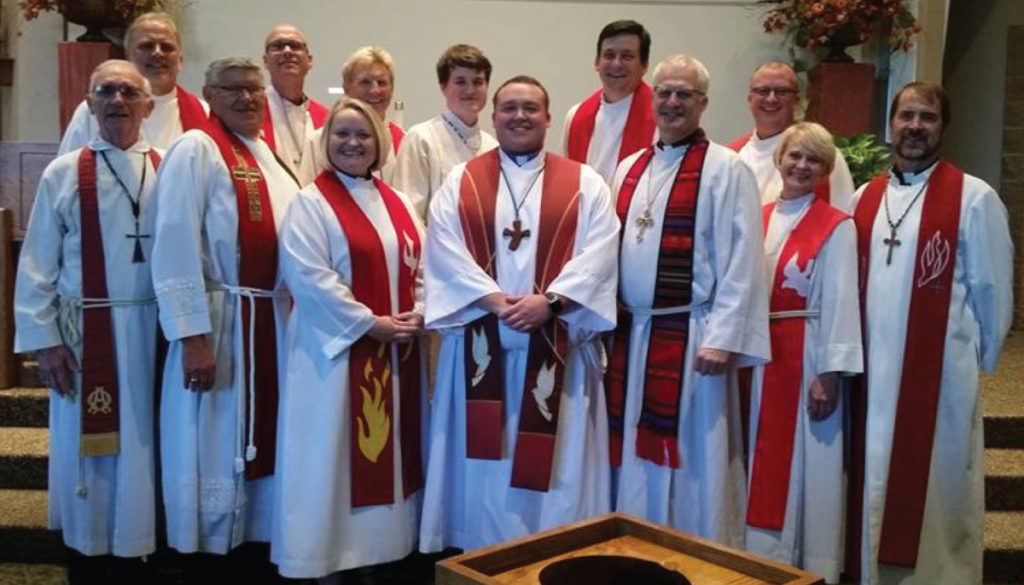+Rev. Dr. Pederson, Director for Evangelical Mission
Many of us remember asking our parents on the way to Grandma’s house, “When will we get there?!” In the midst of Stay-at-Home 2020, all of us wondered when things would get back to normal for daily life and for church life. And if someone had told you last February, that there would be no Easter services in your building this year, people would thought it was the worst thing ever to happen in your church. Under your watch: the end of the church!
Well, guess what? Easter services did not take place in your building, and it was O.K. Everything moved ONLINE. The church left the building and was the church. Congregations immediately began engaging people to love one another in new ways: learning technology, cheering on health care workers, buying groceries, telephoning members, giving online, helping with home schooling, pitching in at food shelves, delivering food, helping folks who are homeless, and sewing masks. You did all of that!
Life before COVID seems like a long, long time ago, in a galaxy far, far away. But our people still want to know, “When will things get back to normal?!”
Then on Memorial Day, life became more grievous and complex. The murder of George Floyd has moved the people in small towns and cities across the country to listen to each other and speak out against the sin of racism, and examine the privileges known to white people in ways we haven’t addressed as a nation and as church. We pray we will not return to the old normal of ignoring racial justice.
As we do all of this, the Gov. is slowly turning the dials on in-person gatherings ever so gently. After months of being apart from each other, people are so looking forward to that great day when we can get back to normal in so many ways – get back together in the sanctuary, see the people we love, sing our favorite hymns, have discussions and Bible study, and be together just like we’ve always done.
But BEFORE the COVID dials turn much more, this is a time to push the HOLD button, and even hit the RE-SET button on the way we did ministry and what those ministries might look like. “Normal” the way we used to know it is not coming back. Maybe the word itself is no longer helpful. All we know is that we are here now, and God is here now – whatever “here” means. And this summer of 2020 provides a tremendous opportunity to have honest conversation about where we’ve been, what we’ve learned, and the future God might be envisioning for our congregation.
Biblical Foundation: Isaiah 49:1-6. God’s people were in exile, away from the place where they worshiped God, feeling isolated and forsaken. Their hope was that they would eventually be able to return home to worship and enjoy the calling God had given them as God’s servant. But God said, “Hold on a minute. When you get back home life isn’t going to be like it was before. Things have changed. There’s a new normal you have to adapt to, and then another next normal. You need to prepare yourselves for that reality. And actually, I haven’t just called you to roll up yourselves and serve yourselves; I’ve called you to be a light to the nations, that my saving power may reach everyone on earth.”
What if God is calling the church today into a whole new reality? For 20 years, many of us have been acknowledging that we need to press a re-set button for the church. Attendance has been dwindling, mobility increasing, loyalty lagging, communications technology changing the world as significantly as the printing press once did, and we wondered: If this is another reformation, what exactly is God calling us into as the church in the 21st century?
With the pandemic of COVID-19, the church left the building and learned new ways of communicating, gathering, worshiping, and loving others. People are tuning in. Families are comfortable worshiping at home. People who haven’t shown up in years are joining in and – even affirming the sermon. The kids of our congregation who long ago moved away and remain without a church, are tuning in, and saying, “That’s my church!” People are offering prayers for friends, emojis of love, hosting watch parties, and thanking their pastors for hanging in there. We wonder: Will people want to come into a church building for worship again? Predictions are that some will not.
With growing recognition of the pandemic of racism, the church began talking about our history in this country, young people are speaking out, people are having deep conversations, and this is a moment when we don’t want to fell asleep on this issue ever again.
While we’re together, apart – we’re recognizing what’s most important in life, what we seem to be able to live without, what we truly value. It’s an opportunity to ask how we will live out the greatest purpose God has for our congregation – building life-giving relationships with God, one another, and the world.
Process: Right now, God is here and giving leaders, church councils, and congregation participants, time to step back, push the re-set button, and reflect: How has the pandemic impacted the ministries we do and how we do them? What are you seeing and hearing in your congregation and in your community? What do we need to put on hold before resuming things again? What do we never want to do again? What is God calling us to improve or grow? Most importantly how is God showing us WHY our congregation exists?
Using Zoom meetings of church councils, staff, key leaders, and/or committees:
- Begin with the entire group in the Biblical devotion.
- Provide the background on why it is important to have this conversation now.
- Be sure everyone has a copy of the discussion questions, or create your own response page for people to write notes. Participants could break into rooms. Group: designate a note-taker.
- Focus intentionally on each of the 3 areas of building life-giving relationships with God, one another, and the world; or apply the questions to a particular ministry.
- What have you noticed about your congregation’s response to life these days in terms of life-giving relationships with God, one another, and the world?
- What behaviors are you seeing?
- What do we really miss?
- What have we stopped doing, but do not miss, because honestly, it was more life-sucking than life-giving?
- What does this response indicate about what our congregation values?
- Back in the large group, groups report what they heard.
- For discussion: What new possibilities might God be opening up if our congregation pursues these behaviors or values in the coming months?
- What first steps do we need to take? Who will take them? By when? How?
- How can we involve more people in our decision-making or planning?
- What resources do we have – and/or need – to move forward these steps?
These questions or others could be repeated for a congregation’s ministry areas as they reflect on the vitality of their life-giving relationships with God, one another, and the community.


